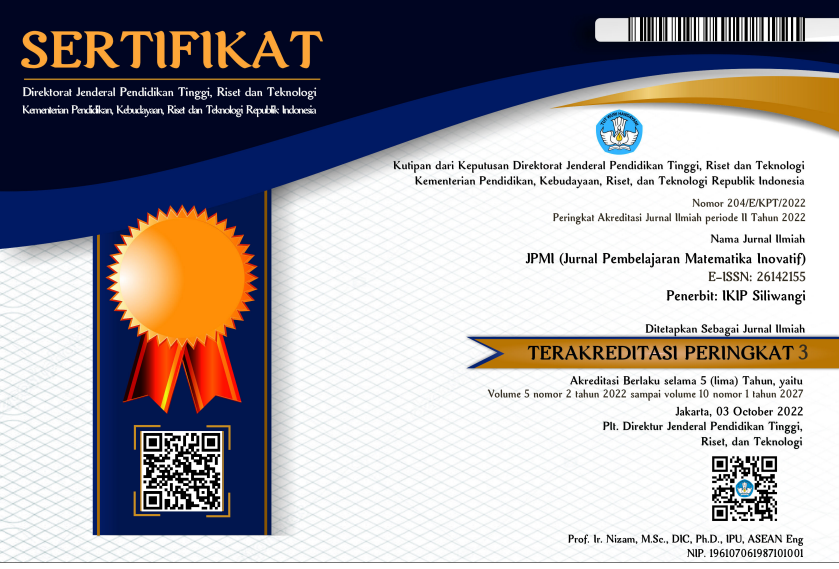Kemampuan siswa dalam memecahkan masalah program linear: Sistematik literatur review
DOI:
https://doi.org/10.22460/jpmi.v6i4.17639Keywords:
Systematic Literature Review, Linear programming, mathematical ability, the analysis of error, the analysis of difficulties of studentAbstract
References
Ahmad, H., Pendidikan Matematika, P., Al Asyariah Mandar, U., Mandar, P., & Barat, S. (2018). Analisis kemampuan siswa dalam menyelesaikan soal cerita pokok bahasan program linear. Jurnal MathEducation Nusantara, 1(1), 20–24. https://doi.org/10.32696/JMN.V1I1.3
Ariawan, B. (2015). Menyelesaikan permasalahan program linier menggunakan geogebra. Seminar Nasional Teknologi Pendidikan UM, 69–85.
Ayuningsih, R., Setyowati, R. D., & Utami, R. E. (2020). Analisis kesalahan siswa dalam menyelesaikan masalah program linear berdasarkan teori kesalahan kastolan. Imajiner: Jurnal Matematika Dan Pendidikan Matematika, 2(6), 510–518. https://doi.org/10.26877/imajiner.v2i6.6790
Chang, F.-R. (2004). How to solve it. in stochastic optimization in continuous time (pp. 169–224). Cambridge University Press. https://doi.org/10.1017/CBO9780511616747.007
Djamaluddin, A., & Wardana, W. (2019). Belajar dan pembelajaran (A. Syaddad (ed.); Vol. 1). CV. Kaaffah Learning Center.
Facione, N. C., & Facione, P. A. (1996). Externalizing the critical thinking in clinical judgment. Nursing Outlook, 44, 129–165.
Fikri, F. N., Mardiayan, & Kuswardi, Y. (2017). Analisis kemampuan berpikir kritis dalam pemecahan masalah matematika berdasarkan langkah-langkah facione pada materi program linear ditinjau dari minat belajar siswa kelas XI MAN Purwodadi. Jurnal Pendidikan Matematika Dan Matematika (JPMM), 1(2), 20–36. http://dissertation.laerd.com/purposive-sampling.php#types
Islami, F. H. (2021). Kajian literatur model pembelajaran bermakna (Meaningful Learning). https://doi.org/10.31219/OSF.IO/DM284
Kadir, abdul. (2013). Konsep pembelajaran kontekstual di sekolah. Dinamika Ilmu, 13(1), 17–38. http://journal.iain-samarinda.ac.id/index.php/dinamika_ilmu/article/view/20
Lusiana, S., & Putri, K. K. (2020). Analisis kemampuan komunikasi matematis siswa dan self confidence siswa pada materi program linier. Seminar Nasional Pendidikan Matematika, 2(1), 26–37.
Nurjanah, S., Istiqomah, & Sujadi, A. (2018). Analisis kesulitan siswa dalam menyelesaikan soal-soal program linear pada siswa kelas X TKJ SMK PIRI 2 Yogyakarta. Journal of Chemical Information and Modeling, 53(9), 1689–1699.
Rahmah, N. (2018). Belajar bermakna ausubel. Al-Khwarizmi: Jurnal Pendidikan Matematika Dan Ilmu Pengetahuan Alam, 1(1), 43–48. https://doi.org/10.24256/jpmipa.v1i1.54
Randolph, J. J. (2009). A guide to writing the dissertation literature review. Practical Assessment, Research and Evaluation, 14(13).
Rumetna, M. S. (2021). Optimasi jumlah produksi roti menggunakan program linear dan software pom-qm. Computer Based Information System Journal, 9(1), 42–49. https://doi.org/10.33884/cbis.v9i1.3645
Simon, M. A. (1995). Reconstructing mathematics pedagogy from a constructivist perspective. Journal for Research in Mathematics Education, 26(2), 114–145. https://doi.org/10.2307/749205.

















